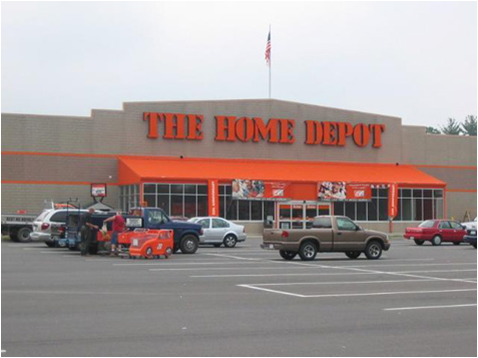By Doug Stephens
You know business is tough when you have to sell off parts of your parking lot to make your revenue numbers. However, news out of Atlanta suggests that’s exactly what home improvement giant, The Home Depot intends to do. Saddled with too much asphalt and too few customers, the one-time retail juggernaut is seeking buyers in retail and food service to set up shop on its tarmac – of which it owns approximately 89 percent.
 According to Home Depot’s Vice President of Real Estate Mike LeFerle, the company has identified unused portions of parking lots at hundreds of its stores in the U.S. and Canada. They will be looking to sell to complementary businesses that target a similar customer base. Parcels are said to be approximately half an acre or more.
According to Home Depot’s Vice President of Real Estate Mike LeFerle, the company has identified unused portions of parking lots at hundreds of its stores in the U.S. and Canada. They will be looking to sell to complementary businesses that target a similar customer base. Parcels are said to be approximately half an acre or more.
The question being asked by some industry experts is “Shouldn’t Home Depot be focusing energy on filling those parking lots with customers instead of selling them off? Others see the move as a smart use of capital that will give the chain the short-term cash it desperately needs, given the decline in its store business.
In my opinion, both views miss the big underlying issue. The implications of this move speak volumes about the long term future of The Home Depot – and all big box formats- as a business model. Here’s why.
When Home Depot built these stores, they constructed parking lots to mathematically accommodate peak store traffic levels – it’s a pretty exact science. The size of the parking lot is directly proportionate to sales expectations. With that in mind, you don’t cut the size of your parking lot by acres at a time, in response to short-term market downturns. Permanently reducing the size of the lot is a clear admission that the store will never again achieve the peak level of traffic it was built to accommodate. That’s important because this could be the first time that Home Depot has ever definitively signaled that they’re current store model can’t be supported in the long run.
But it makes perfect sense. Not only are Baby Boomers on the down-size, many have been beaten up financially. Secondly, in the cold light of recovery, the excess consumption of the last twenty years seems to be giving way to a more sober and responsible attitude toward spending in general. Lastly – and this is the showstopper – the boomers’ closest demographic cohort, Gen X is significantly smaller as a generation – some estimate as much as fifteen percent smaller. In other words, even if Gen X spent like drunks, they likely couldn’t reach the post-crisis spending levels of the Baby Boomers.
So, while selling off unwanted parking lot space may offer short-term cash, it doesn’t really constitute a long term strategy to deal with what are shaping up to be some substantial long term issues.The real question is, once you’ve sold off all your unproductive parking lot space, what’s next?

